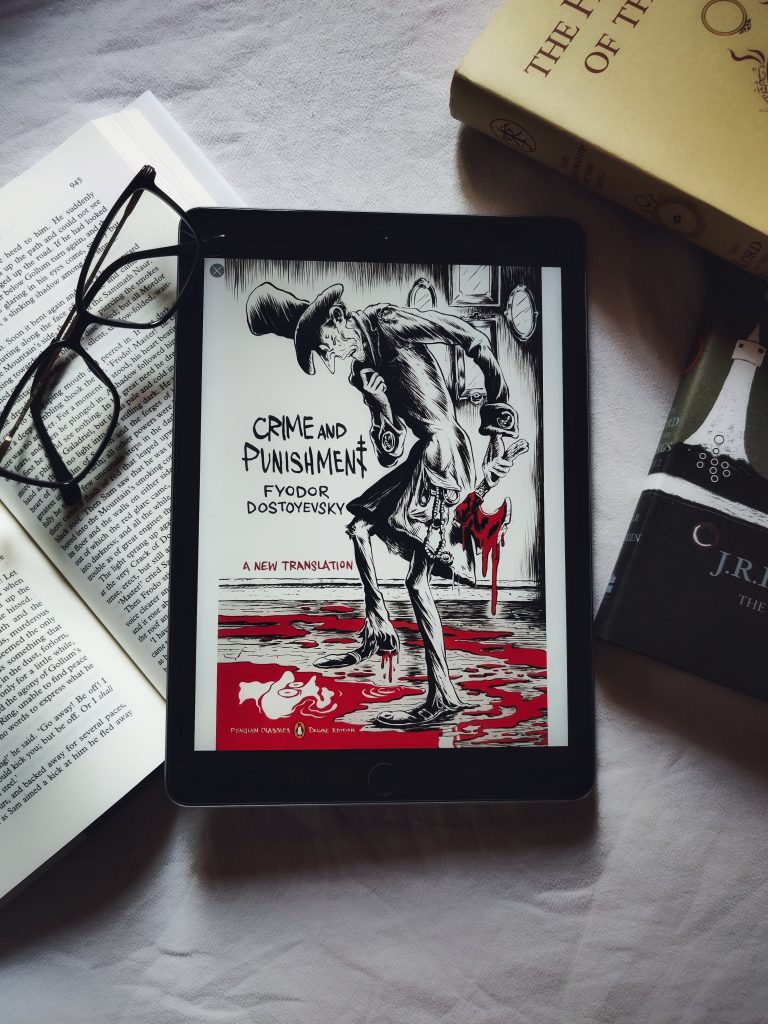Introduction
Crime and Punishment is the most horrific and brilliant literature of 19th-century Russia. Regarded as one of the most significant writers of all time, Fyodor Dostoevsky was a major critique of utopian vision embedded in nihilism and the bending of traditional moral virtues. Crime and Punishment are so deep that it’s impossible to assess all patterns in the first read. The characters, story, philosophical elements, and theological liberation make this book a light in the darkness.
It is set in a dark theme; every human on Earth should read this book. It is pleasing and tends to extrapolate into the more profound philosophical ideas and vision of the 19th-century world. So what makes this book a dark gem? Well, many reasons, and a few messed up my head which are discussed in this article.

Brief Summary
Crime and Punishment are based on the story of a fictional character named Raskolnikov, a brilliant student at the University of Saint Petersburg, Russia. He was living a life of poverty, leading to a social disconnect, resentment and anger; therefore, he decided to lead a life in his way and make a difference in society. A mean old pawnbroker in the city mistreated her disabled sister, a woman threatening the community. Hence, Raskolnikov decided to kill her and was successful, but after killing her, the old pawnbroker’s sister saw the whole incident, so Raskolnikov killed her too.
After killing two innocent people, Raskolnikov was not the same; he began to lose his mind from the fact that he was a murderer, and the guilt started consuming him. He couldn’t eat, sleep or focus on anything. On top of that, his sister was marrying a guy who pitied her for social status, and his mother kept great hopes for Raskolnikov, but he could not provide for his family. The love interest of Raskolnikov was a prostitute who was providing for her family by selling herself. All this build-up to the character of Raskolnikov and the story.
At last, he was found guilty and served eight years in the cold prison of Serbia. In prison, his love interests visited him and kept him updated about the news from the outside. In the end, she offered him a copy of the bible and asked him to redeem himself and get free from the burden of the crime. Surprisingly, Raskolnikov asked for forgiveness and was delivered, and a new man was born that day who got married and started a new life.
The Higher Man
One of the story’s significant aspects is a higher man’s foundation. In the eyes of Raskolnikov, a taller man is an exceptional individual who can unfollow the significant moral order of society and pursue a higher and more important goal. It is similar to what Napolean was, or someone like Hitler, individuals who didn’t need religious or moral instructions to dictate their life as those codes were meant for sheep or herds. The killing of Raskolnikov was an act done by a higher man who very soon realised that moral principles are not meant to be bent for anyone, and whoever breaks those codes will come to a judgement someday in some way.
Demise of Goodness
In the story of Raskolnikov, readers can witness the demise of goodness from the heart of Raskolnikov as his act of butchering two innocent people was supposed to cause well in society. Still, it was the final nail in the coffin of Raskolnikov’s self. He killed himself that day and lost a crucial part of himself, meant to be an excellent and aspiring human being. His resentful nature cost him the freedom of life and pursuit, and now he was stranded in the abyss of guilt and a call for redemption.
Nihilism: Pathway to Self-Annihilation
The meaningless of life is one of the major philosophical questions in people’s lives; Raskolnikov was caught in nihilism not because he thought that life was empty but because he acted in a way that life was meaningless and the death of two people would not a made any difference in the lives of the people of St. Peterburg. Still, it made a difference, which was reflected in the life of Raskolnikov and the impact it had on the people around him. So in a way, life is meaning, and killing is a win for nihilism; when a sane person like Raskolnikov kills others, a meaningful part of him also dies.
Pity for Thyself
Human beings can take great pleasure from pity, as in the story of Crime and Punishment, different characters take great pleasure if others pity them. It is also notable in reality because it gives people the attention they crave, such as unwanted attention fueling ego and pride. No one has the right to attend without generating value for others, as life does not owe anyone anything. Still, in the book, the characters demanded their share of energy from others as if they were owed by others, which is not the case and should never be.
Hidden Guilt
Even if you don’t believe in God, there is one person to whom you can never lie: you. After killing the sisters, Raskolnikov was free, and no one even doubted him to murder those women, but his guilt ate him alive as he began to lose his mind. He didn’t know how to live or react to anything in life. The only path to liberation was telling the truth and suffering for what he did. At the end of the story, he confessed his crime and was punished with eight years in Serbia.
Liberation: Act of Mercy
Even after getting jailed in Serbia, there was no change in the character of Raskolnikov, he was getting what he deserved, but he was still the same guy until, one day, his whole personality changed. It happened when his girlfriend brought him the bible, and he suddenly was liberated from the crime he committed. It was like he suffered in the flesh but not in the soul. After reading the bible, he honestly confessed to his true self and was liberated for life ahead of him, hopeful and merciful.


Pingback: The Truth About Free Will: Brothers Karamazov by Fyodor Dostoevsky
Pingback: Ranking the Fyodor Dostoevsky Literature: From Worst to Best